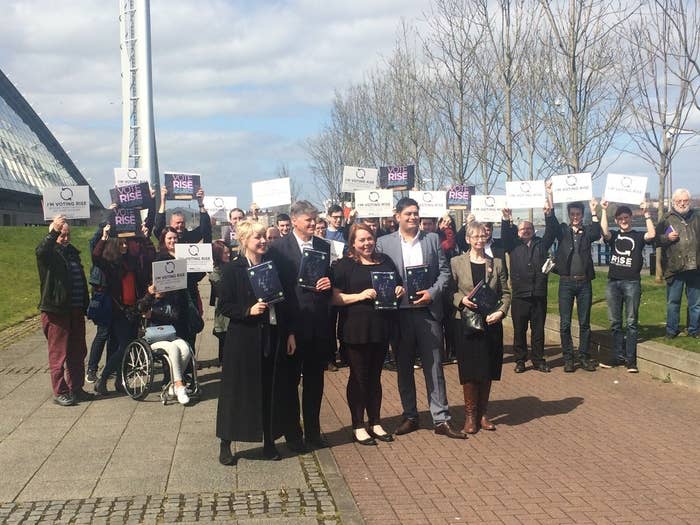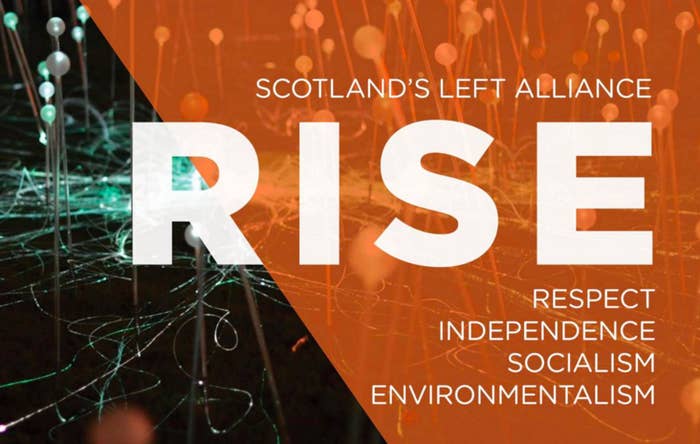
RISE, a new left-wing alliance created for the upcoming Scottish election, has accused the SNP of "backsliding" on independence.
The new party launched its Holyrood election manifesto in Glasgow on Tuesday, which contained ambitious policies such as free public transport for everyone, a wage cap of £100,000 for public sector workers, and a maximum of two parliamentary terms for all politicians.
However, a party candidate said independence is still "the elephant in the room" when it comes to Scottish politics, and attacked the SNP for not being strong enough on the issue in the run-up to the election on 5 May.
"RISE is aware there are many, many SNP members and activists privately far from happy with the new party line," said RISE candidate Colin Fox. "They fear the SNP is backsliding on their central objective of independence and ought not to have ruled out another independence referendum for five years.
"That is why more and more people are turning to RISE with their second vote in these elections."
RISE was born out of the Radical Independence movement, which came together during the 2014 referendum, and the party name stands for "respect, independence, socialism, environmentalism".

The party pledged to use whatever influence it has – which activists hope will amount to one MSP for each of Scotland's eight parliamentary regions – to push the SNP into holding another referendum in the next five years and to pull the government to the left.
"The SNP, in our view, offers a conservative vision of Scotland," said Fox. "One that offers far too little to its strongest supporters in working-class areas of Scotland. They talk left but they act right."
However, when pressed on RISE's alternative vision for Scotland, candidates seemed shaky on the details of some of the radical pledges laid out on the manifesto, saying that many of the policies were just designed to provoke a discussion.
For example, the party's co-founder was asked how a pledge to cap public sector wages at £100,000 worked alongside a plan for a 60p rate of income tax on £150,000 salaries.
At the RISE manifesto launch. They seem to be advocating a pay cap of £100k, and a 60p rate on salaries over £150k.
"When it comes to the public sector pay cap, our point about this is that there are extortionate sums of money being paid here," said Jonathan Shafi. "We want to see a cap at £100,000, but that cap isn't something we're going to immediately be able to do. In the meantime, our income tax proposals will help to alleviate the vast inequality that we see."
The BBC pointed out that the manifesto mistakenly says the 40p tax rate begins £32,000 (in fact it starts at £43,001) and asked how that affected the party's costings.
RISE manifesto on income tax. The 40% higher rate starts at £43,001 in 2016 - not £32,000 as stated here. #SP16
"Not much," replied Shafi. "What we want to do with income tax is create a new band so earnings over £150k will be taxed at 60%. If you add up, in the section which involves the whisky tax, the income tax, and the Scottish service tax, what you come to is a figure of around £4 billion. If there's a slight discrepancy then we'll review the figures."
Shafi was also asked if the proposed "whisky tax" – £1 of production tax on each bottle – would be possible to implement as excise duty is devolved to Westminster. He accepted it wasn't possible at the moment, but said it was something the party would like to "get towards".
Additionally, the manifesto said raising the income tax for the highest earners from 45p to 60p would be a 15% increase, when it is 33%.
RISE say changing income tax from 45p to 60p for high earners is a 15% increase. It's a 33% increase, isn't it?
Responding generally to criticism of the detail of the manifesto, Shafi said: "I would point out that, look, we are not in the business of quibbling over 1% here or 2% here. What we want to do is to put on the agenda very, very firmly that there needs to be a massive redistribution of wealth. Without that, without someone provoking that argument, it's just not going to happen."
One of the most eye-catching policies was this pledge for free public transport, which it is claimed would benefit the economy by between £300 million and £500 million.
RISE say universal free public transport would be "to the advantage rather than to the detriment" of the economy.
Asked how this would work, Shafi said: "If you do the calculations of this, if you look at what it adds to the economy, we think there's between £300 million and £500 million of savings you can make as you steadily ... transition towards free public transport. When it comes to investing in free public transport, that would be staggered.
"I would underline that while this is a policy that most people think would be fantastic but most people would think unrealistic, what we try to do is to make this as imaginable as possible. It's phased in, we start off by giving free transport to students and the unemployed, and we begin to turn the corner when it comes to free public transport."
He added: "This, again, reflects the sort of things we will take forward. We're going to take things forward that don't fit neatly into the mainstream of Scottish politics. They don't fit neatly into the to-and-fro being passed around the parliament. What we're attempting to do here is to raise these issues, to provoke a discussion."
